A gentle mist falls upon Caroline Woodward as she looks out over the seemingly endless Pacific Ocean. The light spray collects on her cheeks before streaming down like tears of joy for the opportunity to return to herself and her writing, on a new island home at the Lennard Island Lighthouse.
Lennard Island is situated off the west coast of Vancouver Island — a rugged and remote expanse of rock and evergreens whose long gaze stretches to Hawaii and Japan. Here, at the end of the Earth, Woodward had found her new beginning.
The adventure of a lifetime
Woodward and her husband Jeff George called Lennard Island home for nearly 13 years before retiring in March 2021. Their experience as lighthouse keepers began with a twist of fate.
“I met a relief lightkeeper on a B.C. ferry while I was working as a publishers’ sales rep,” said Woodward in a recent interview with Kinute.
“I rescued the relief lighthouse keeper’s little Jack Russell who was running loose as vehicles were boarding the ferry and we struck up a conversation. I emailed my husband that evening and said I had found our next adventure … and his fingers immediately flew over [to] the Canadian Coast Guard website.”
Woodward had been itching for a change, for a return to the sense of adventure that had once populated her life and to her creative pursuits as a writer.
The initial conversation with the amiable relief keeper anchored her expectations about the daily realities that were woven into this romantic notion. Of course, lighthouse keepers must be able to get along with solitude and all types of wet weather, but they must also always keep their wits about them being attentive to ever shifting weather conditions, punctual with weather reports every three hours, and be generally handy.
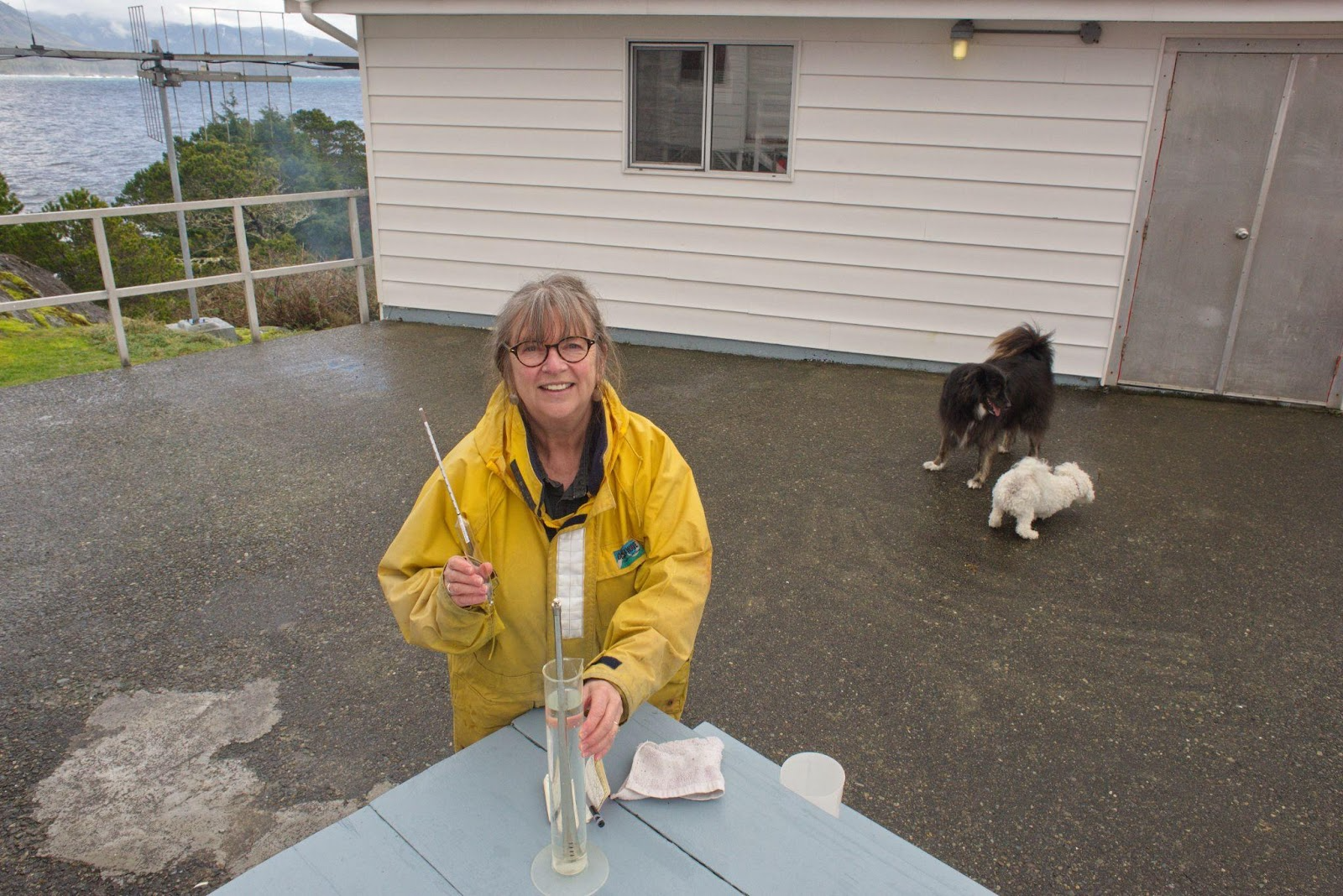
Caroline Woodward checks the salinity and temperature of sea water twice a day. Photo by Jeff George
“The Coast Guard motto is: ‘Safety first, Service always,’ and that motto guided a lot of what was prioritized when the two lightkeepers, principal and assistant, sat down to decide what tasks to tackle in the day ahead,” Woodward said.
“I eventually worked at 12 different lighthouses as a relief and permanent lighthouse keeper between 2008 and 2021. It was the adventure of a lifetime and I loved the work and the environment and getting to ride in helicopters and all kinds of boats!”
She recounts her adventures in her book "Light Years: Memoir of a Modern Lighthouse Keeper."
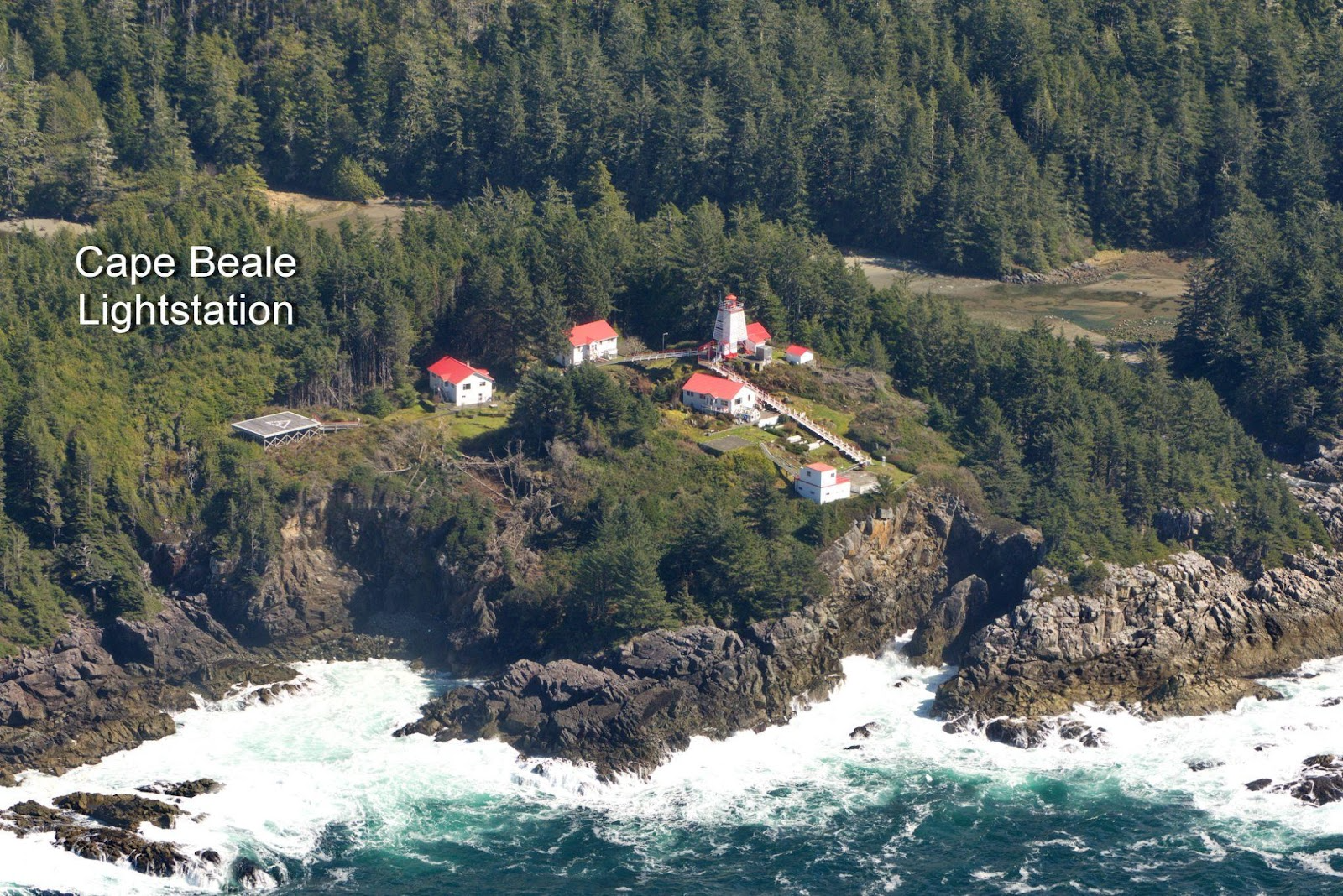
A helicopter view of the Cape Beale Lightstation. Photo by Jeff George
While she and Jeff had whetted their whistles as relief keepers, Woodward jumped at the chance to take on a permanent position as a lightkeeper.
“Lennard Island…is the reason I bowed out of my interesting publishing job to join my husband as a lighthouse keeper," said Woodward. "When he was transferred there, I knew I simply had to live the life, more than the visits we had been able to have while he learned the ropes as a relief keeper. We are very close, best friends, and neither of us liked living apart for weeks and months at a time. All I did was work at my endless amount of work while he was having adventures! I knew I would never write another book if I had to keep selling other people’s books … and I knew, thanks to my upbringing on a remote Peace River homestead, that I would flourish as a writer again without the distractions of meetings and a million other details about books and customers and publishers.”
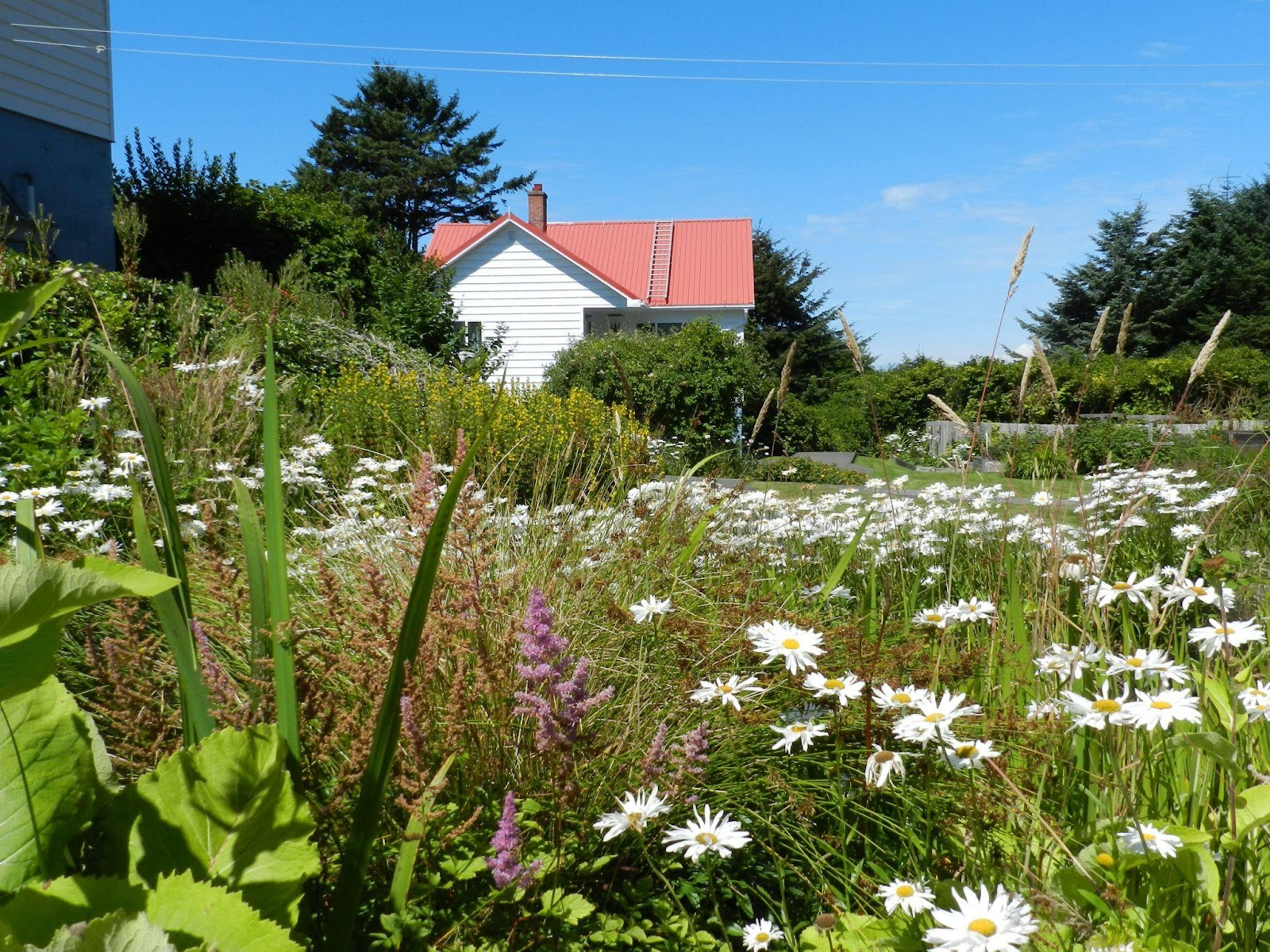
A sampling of Lennard Island’s abundant flowers. Photo by Jeff George
Deep roots
Woodward’s upbringing had indeed prepared her for the adventures and challenges ahead.
“I often think now that I grew up in the 30s or 40s, without electricity, telephone, TV or modern plumbing until I was 12 years old,” she said. “We rode horses and drove wagons and buggies even after Dad bought a tractor and a car when I was in elementary school. Our nearest neighbor was a yellow light we could see when the leaves were gone, half a mile away. [My parents] were both adventurous people and for my dad, it was in 1937 an economic decision to leave Britain for the chance to homestead land in Canada. It was a mixed farm with grain, hay, beef, chickens, pigs, and horses and until they had four children to support, it was possible to make a go of it, like almost everyone else in our rural Peace River community of about 300 people (the same population exists today).”
She recalled that the same hard work her parents put into the homestead was expected from every member of the family.
“As children, we worked at chores from weeding the garden to feeding the cattle and horses and chopping a water hole in the ice of the dug-out, herding cattle, picking roots and rocks, making grain stooks, hauling and sawing wood, the list goes on! I hated doing dishes but didn’t mind most of the outside chores because our parents always thanked us sincerely and we knew our work was valued, no question.”
By the time she entered the first grade, Woodward was further proving her mettle by walking a mile to the bus stop alone. The bus took her to the two-, then three-room schoolhouse she attended until seventh grade.
Her creativity and love of words began nearly as early as her great love of nature, and the ripples of these formative experiences have continued to inspire her.
“I loved writing silly songs and plays for my friends and I to perform,” said Woodward. “Decades later, I published a book called ‘Singing Away the Dark,’ about walking to the school bus stop a mile from home by myself in grade one. It has now been translated into French, Korean, Bulgarian, Japanese, and Chinese which makes me smile every time I think about it.”
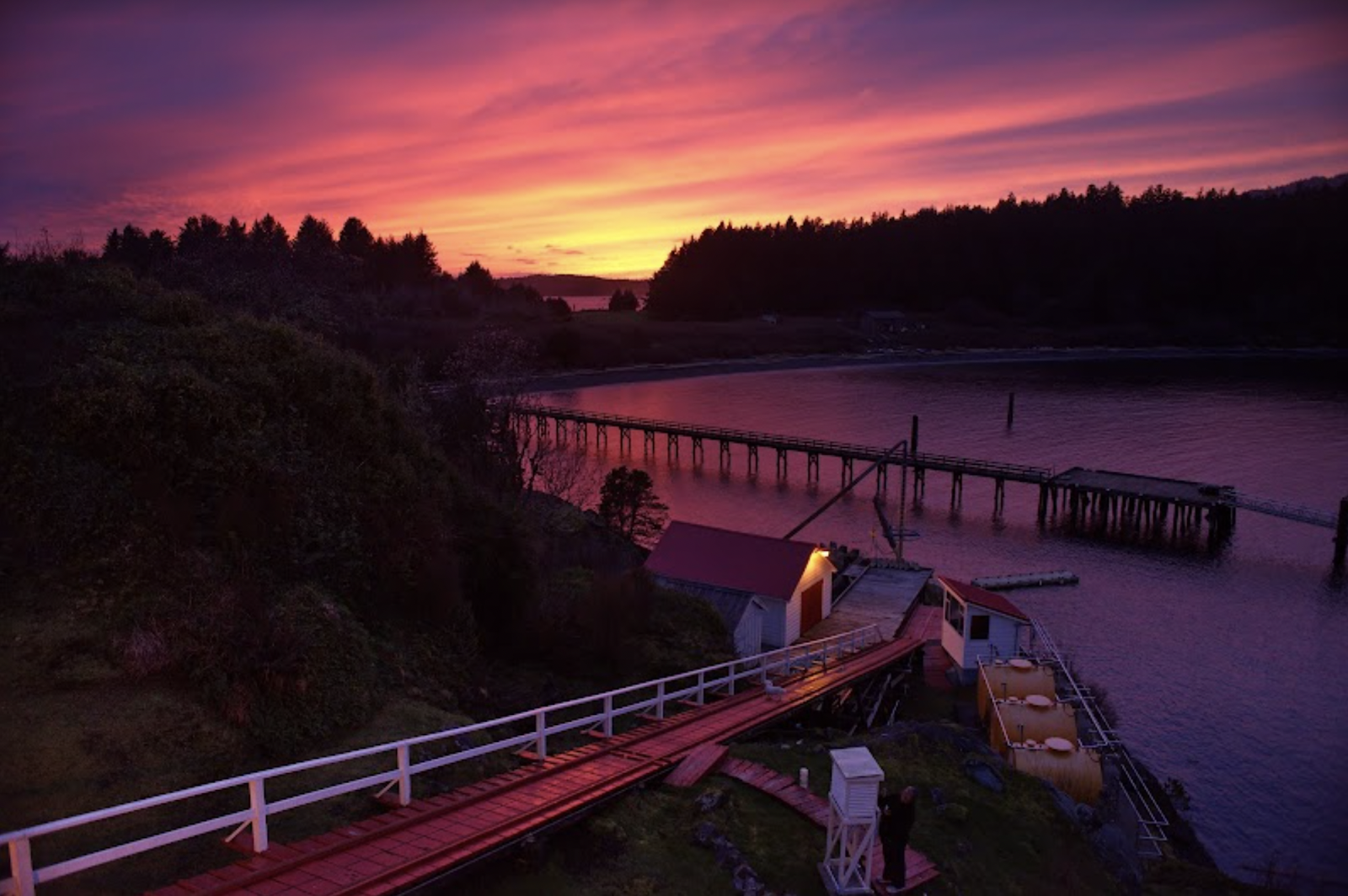
A peaceful night on Nootka Island, where which Caroline Woodward and Jeff George often did long stints of relief work. The view overlooks Friendly Cove where Captain Cook and numerous other seafaring worthies stopped by in the 1700s. Photo by Jeff George
Spreading her wings
Although her upbringing was rural, Woodward first ventured away from home in books, then with her 4-H group to places like Vancouver and New Brunswick. These early travel experiences kindled a desire to see more of the world, one that was fortified by her secondary education and began to blaze in her young adulthood.
After completing eighth grade by correspondence Woodward attended high school away from home in Fort St. John.
“The road out to where we lived was too unstable and challenging to keep open for a daily bus route,” she said. “So, 60 teenage boys and girls from remote northern places converged on the Dorm, run by a stern English matron who patrolled the halls on the lookout for giggling, the flapping of True Confessions magazine pages and the odor of cigarette smoke during study hours every evening. Being away from home for at least five days a week was also good preparation for attending university 800 miles away for many months at a time.”
While attending university Woodward really spread her wings.
“During my final year of my B.A. at the University of British Columbia [UBC] in Vancouver I applied for a three-month overseas volunteer placement with Canadian Crossroads International. I ended up in Sri Lanka building roads with…villagers and other international volunteers. I learned a lot about Buddhism and we three Canadians sang a lot of folk songs by popular request! [Later,] I joined my sister to work in a hotel in Zermatt, Switzerland and skied and ice-skated a lot and sang more folk songs. Following that an acquaintance from Zermatt and I bought 10 speed bicycles in Bari, Italy, and I ended up cycling to Corfu and then going on by myself (with angels flapping their wings overhead) across Greece to Athens and on to Spetsai.”
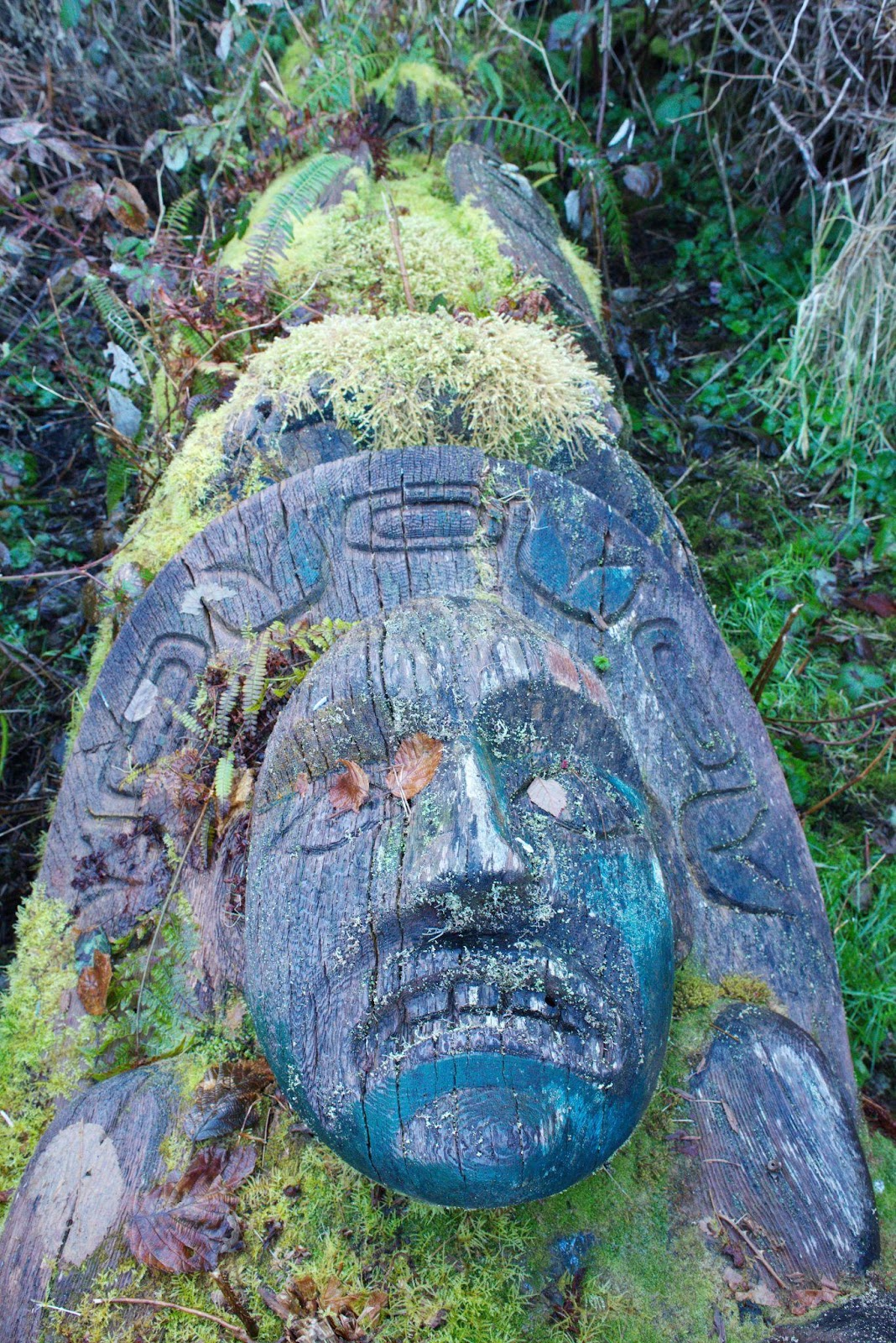
An ancient First Nation’s totem found on one of Woodward’s explorations. Photo by Caroline Woodward
Upon her return to UBC she took an experimental teacher education program and returned to her travels leading youth to Sri Lanka and India for Canada World Youth, an experience she described as “like being on a social studies field trip for seven months at a time.” And fondly stating, “I am so grateful to have had these experiences while in my 20s.”
These adventures also mark the inception of Woodward’s formal writing career when she wrote her first national magazine article for Miss Chatelaine about bicycling across Greece.
She later went on to study creative writing at David Thompson University Centre, describing the program as “a great multi-disciplinary mix of music, writing, theater, visual arts, rural education and university level English and linguistics courses. The average age of the students was 28 so people tended to have diverse backgrounds and to be serious, not to mention grateful to be taught by working artists.”
It was during this time that she met her husband, Jeff, a fellow student in the program. Their connection was natural. “Jeff and I both come from small rural communities, but we read a lot as kids and longed to see the world and do lots of different things with our lives including travel, so we had a lot of shared values in common.”
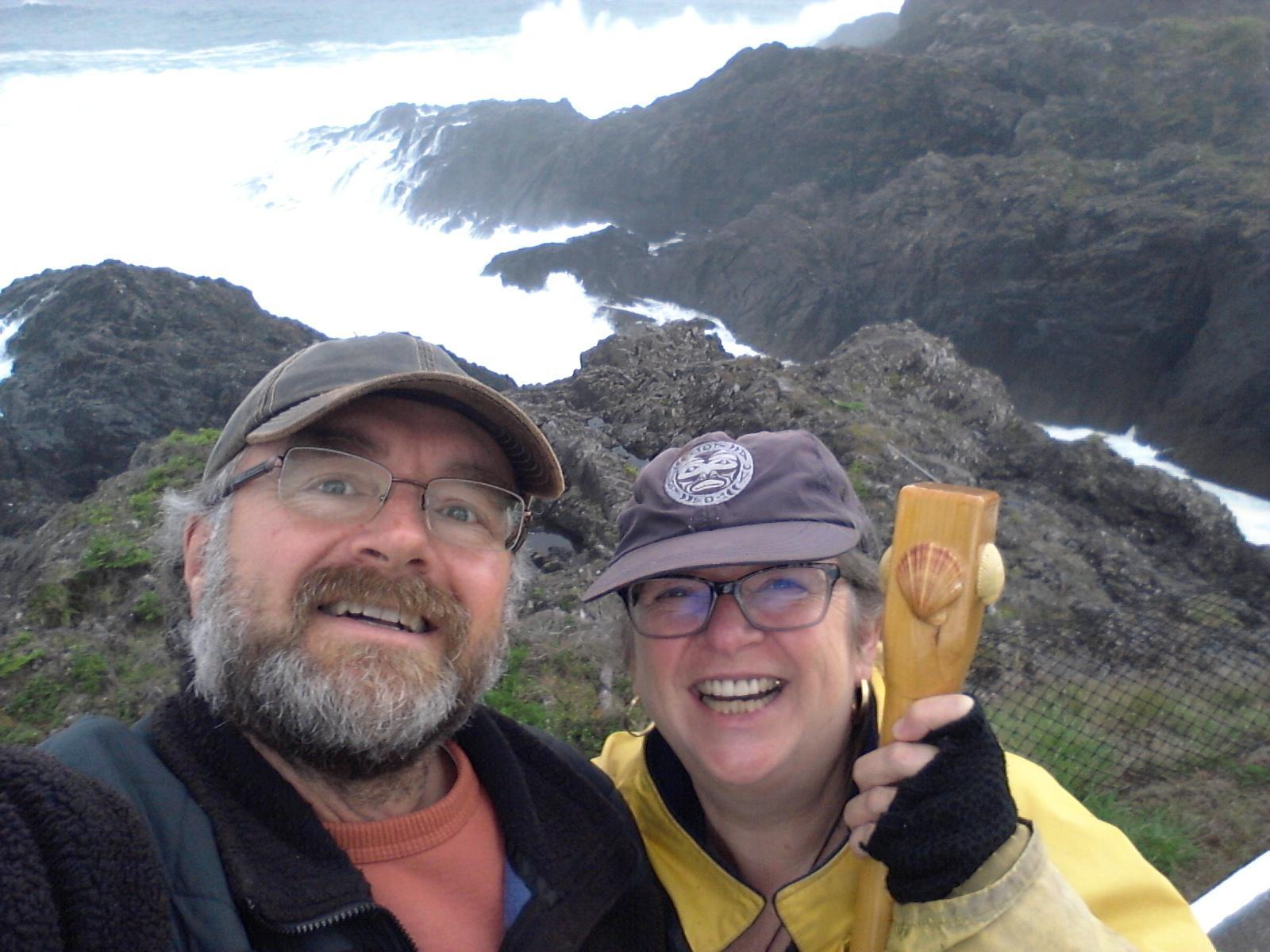
Adventure buddies Woodward and Jeff. Photo by Jeff George
With open eyes
These shared values are precisely what led Woodward and her husband to their great Lennard Island adventure. “It was our late middle-aged adventure, and we knew it and appreciated it all so much,” said Woodward.
It is rare to go into a decision with so much clarity — perhaps that is what comes from choosing what truly aligns with one’s authenticity. When asked what drew her to this lifestyle and called her to stay, she said, “The time, precious time, at long last to write and the wilderness I loved in which to live.”
The treasures of this remote wilderness included sightings of Orca whales, black bears, wolves and world-class marine wildlife.
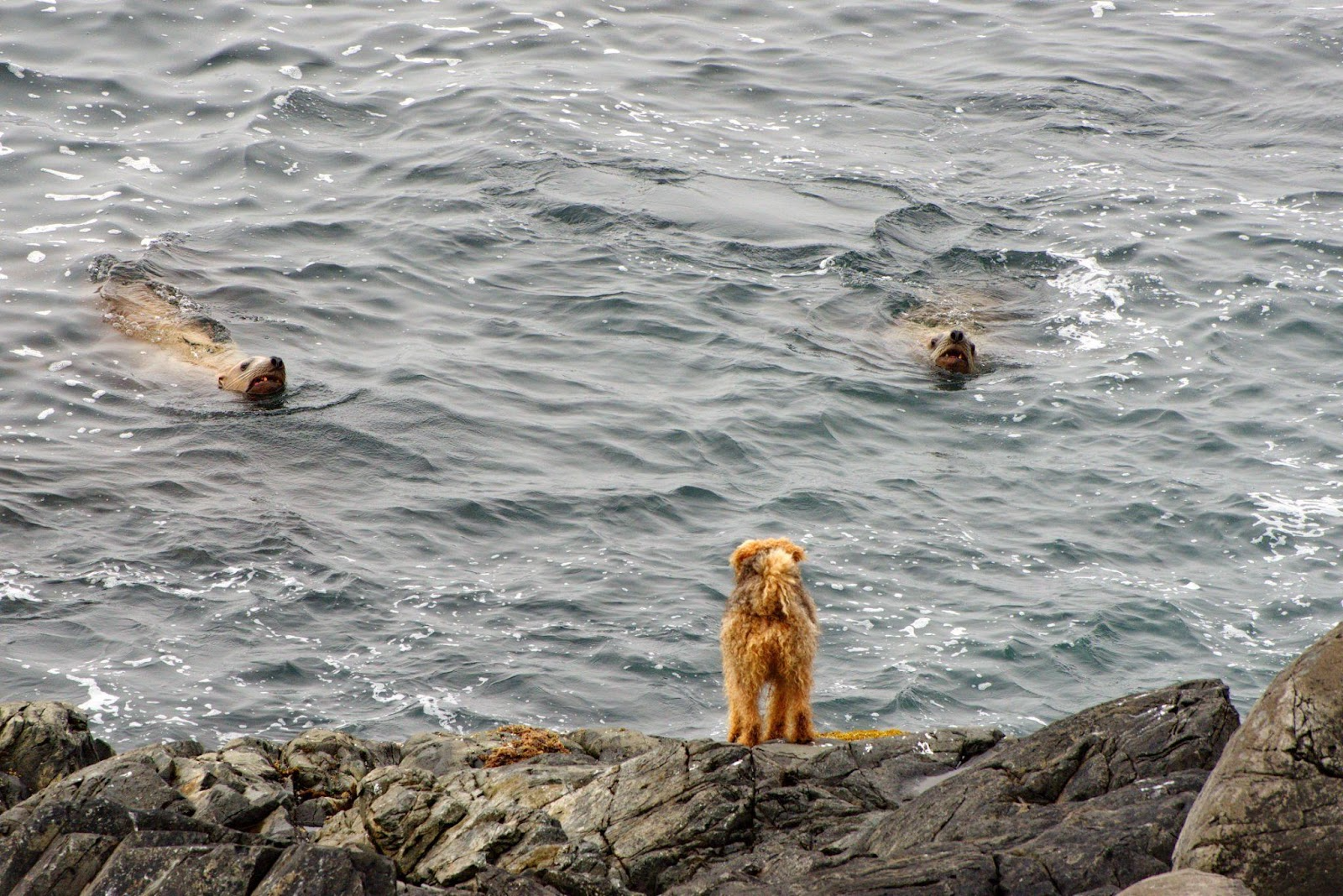
Sea lions coming to say hello to the neighbors. Photo by Jeff George
While these experiences can surprise and delight, they can also be harrowing — like the time Woodward and Jeff encountered a lone male wolf while out with their dogs.
“He just looked at us like Clint Eastwood sneered in The Good, the Bad and the Ugly, and loped away very casually. We had a plan worked out ahead of our walks as to who would scoop up which dog and how we would stand back-to-back with our brass-ended walking poles to defend our pooches to the death … this encounter revealed the fear factor and that we did stick to our plan, and all went well. It’s hard to say who was more surprised, the big wolf or us!”
Although daily life was one of solitude and immersion in nature, there were opportunities for reprieve.
Tofino is a 3-mile water crossing from Lennard Island and boasts a huge tourism draw due to its proximity to Pacific Rim National Park. It is home to cafés, restaurants, independent bookstores, First Nations’ galleries and outdoor outfitters. There was also access to bulk organic food that filled in the cracks between monthly Coast Guard grocery drops and Woodward and Jeff’s impressive garden — a garden she was known to stock with seeds and seedlings she gathered while on her kayak.
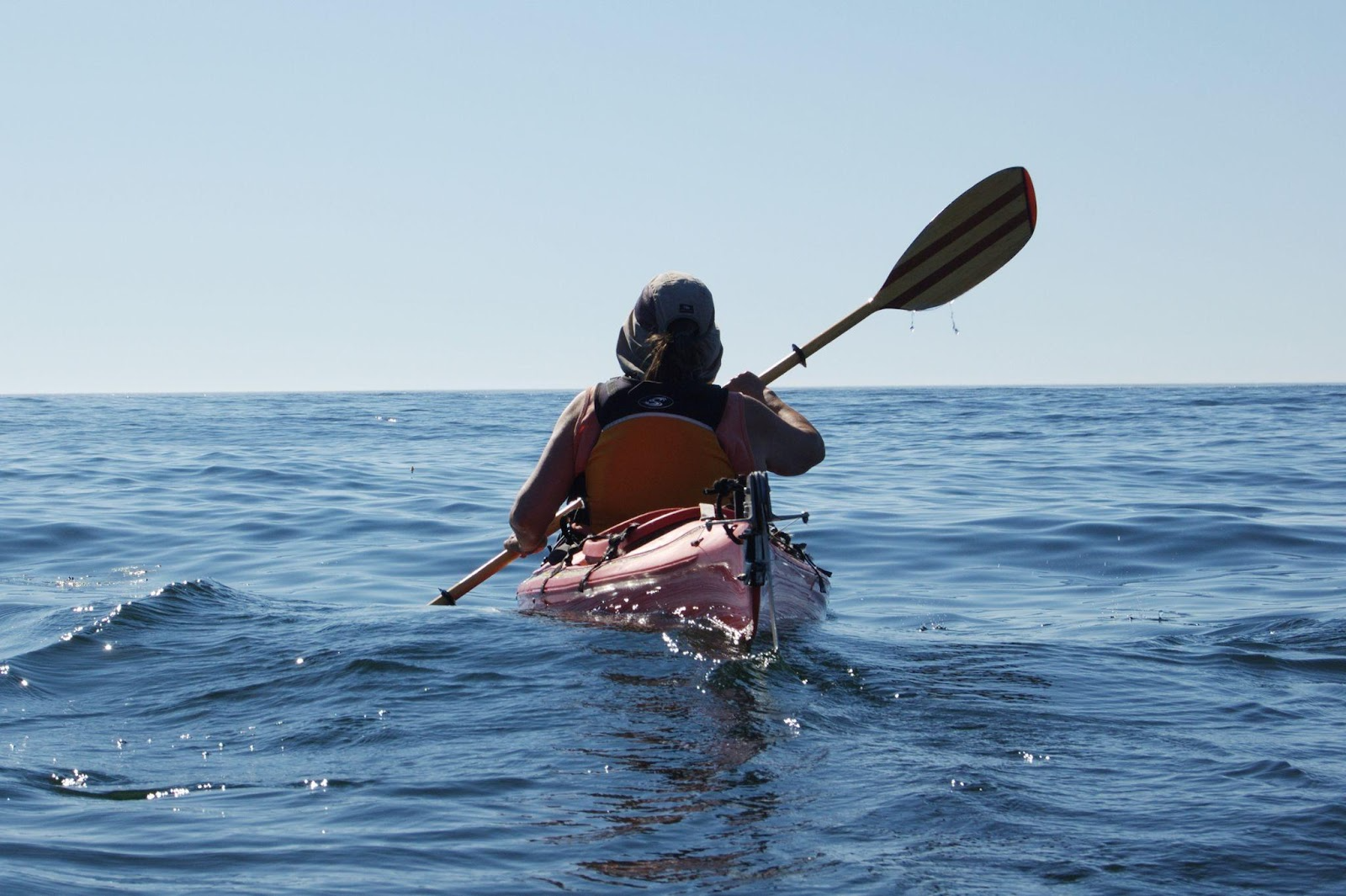
Woodward sea kayaking in the Pacific Ocean. Photo by Jeff George
The garden was a necessity and a joy — one that they worked hard for. The land had been polluted by heavy metals from the years of lead paint being shed from the buildings and hand railings, and the Fresnel lens had floated in a bath of mercury since 1904.
In addition to expanding the greenhouse on the property they were able to improve their growing conditions.
“Thanks to a Coast Guard program which distributed topsoil and lumber and geotextile, a miracle fabric which allowed the copious rain to fall through … but blocked the uptake of heavy metals … we put that program to good effect with asparagus, all kinds of annual vegetables, tomatoes, peppers and English cucumbers in the greenhouse, and raspberries and strawberries and wild blackberries as well as some ancient gooseberries planted by unknown lightkeepers before us.”
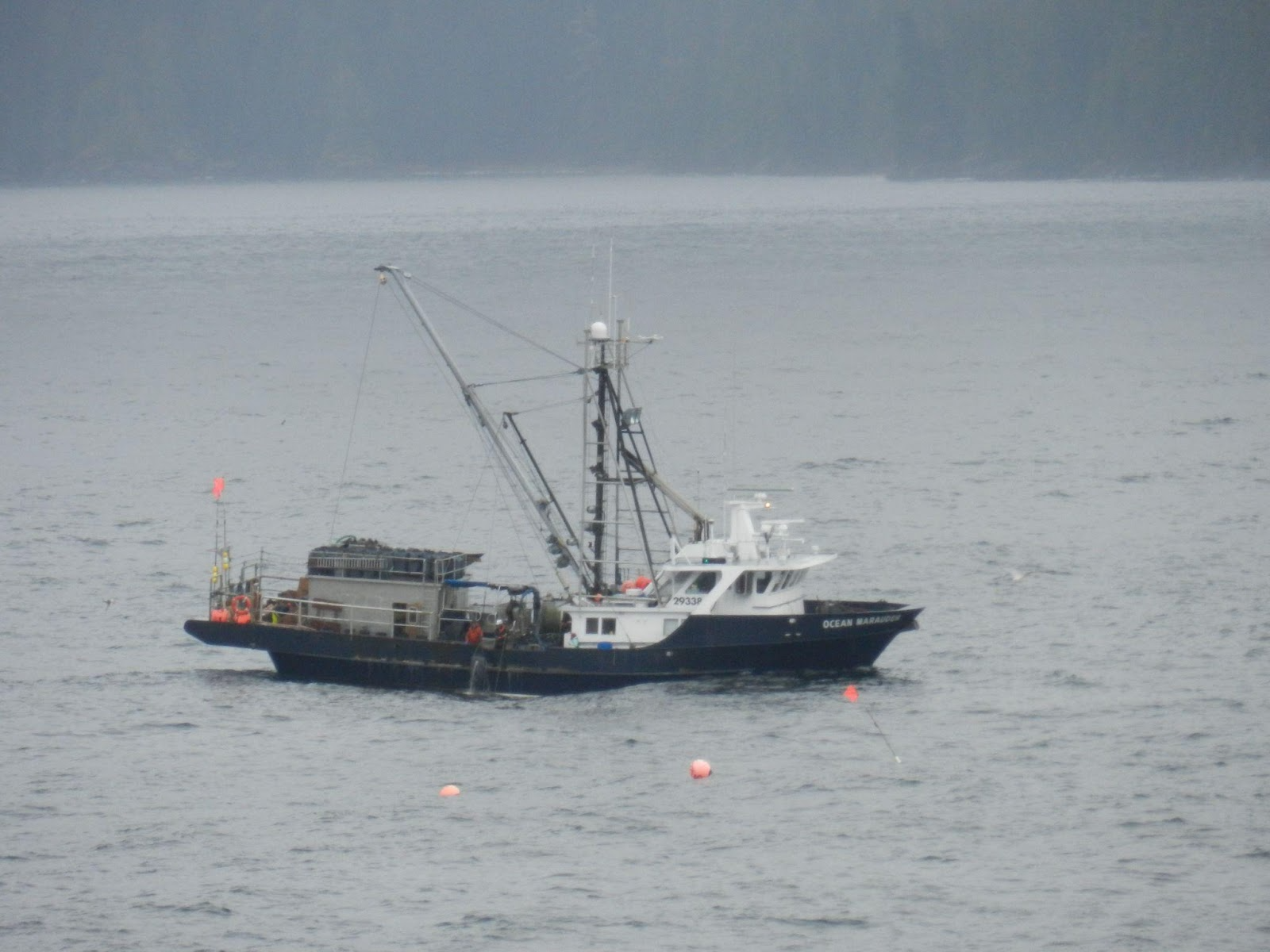
Two fishermen come on shore to borrow some vital equipment from Woodward and her husband to fix a malfunctioning part on their boat. This helping hand was especially important in lightstations far away from villages or towns. Photo by Jeff George
With a greenhouse and a cold frame, they were able to have something fresh throughout the year.
In addition to the garden, Woodward baked bread and Jeff caught fish. It was a life Woodward was well prepared for, one reminiscent of her upbringing. “It was going back to the farm life of my mother and all the other formidable hardworking farm women in the north.”
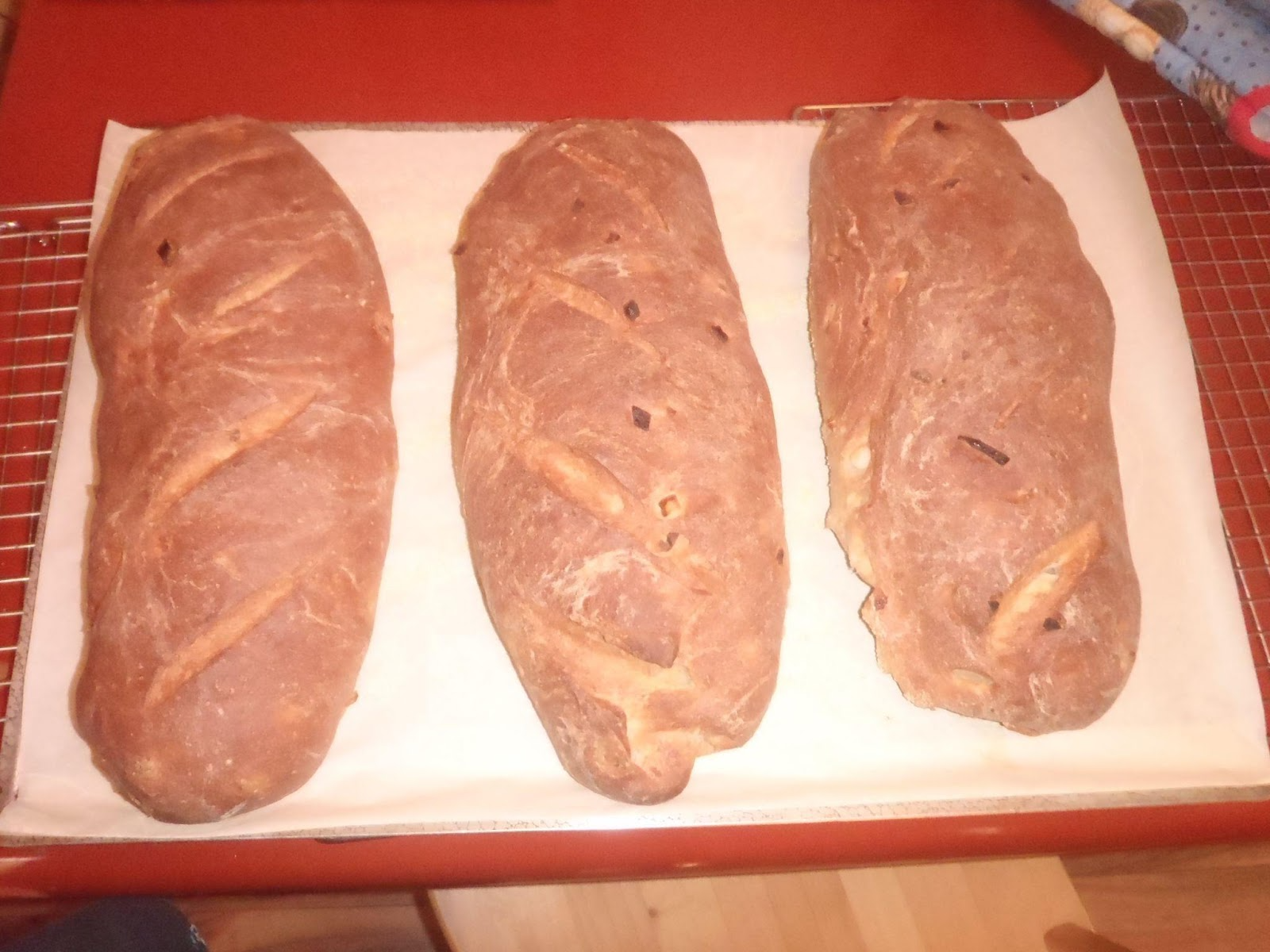
Fresh baked bread is best! Photo by Jeff George
The work and wilderness lent itself well to Woodward’s creative process. While on Lennard she began writing again, as she knew she would.
She was able to correspond with editors via email, and in addition to a variety of radios for communication, she and Jeff installed satellite dishes and lengths of cable to improve cellphone and internet reception. There was also mail service via Coast Guard lifeboat crews, who would even bring them library books.
Life beyond Lennard
Over their years on Lennard Island, Woodward and Jeff were able to keep their love of travel alive by utilizing the service they had once provided as relief lighthouse keepers. This enabled them to venture farther than their local jaunts to places like Cuba, Mexico, France, Switzerland, Italy, Croatia, Greece, India and the U.S.
Since closing their chapter at Lennard, the duo has not slowed down. Woodward and Jeff have begun the enormous undertaking of restoring a 122-year-old house, “with what friends call European flair,” she said.
Beyond that, Woodward is setting her sights on writing more books and traveling again, following the spirit of adventure that has characterized her life.
“It is more invigorating than living in my head to go out into the world and really listen to other people and to the natural world itself … I plan to have adventures as best I can until I’m bidding this world adios.”
